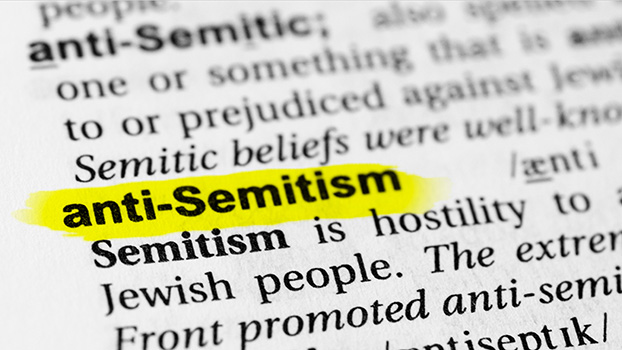
As a number of studies and reports have already demonstrated, antisemitism did not disappear from Germany, Europe, or the rest of the world after the Holocaust. Antisemitism first and foremost poses an immediate threat to the welfare of Jewish people. In societies where it takes root, it can lead to an erosion of solidarity, inclusion, equality, democracy, and human rights.
At the same time, in Germany as in most European countries, right-wing populist and nationalist parties have been on the ascent in recent years—a trend that often involves growing levels of racism. Jewish people in Europe have also experienced an increase in antisemitism in this period. Various analyses and prognoses concerning the motives, ideologies, and groups feeding contemporary antisemitism in Germany and Europe have already been produced. No political current or social group is completely immune from antisemitic and racist stereotypes. At the very least, there is often a lack of empathy for those affected by antisemitism. In light of this reality, we at the Rosa-Luxemburg-Stiftung also have a responsibility to maintain a watchful eye on the situation on the Left. That said, it is important to note that the main proponents of contemporary antisemitism continue to be located elsewhere: in right-wing groups and anti-egalitarian ideologies, just as they were in the past.
The Rosa-Luxemburg-Stiftung has been tackling the issue of antisemitism since its founding, reflecting upon antisemitic phenomena from a range of perspectives and investigating various aspects in this context with a major focus on self-critique and a reflexive interrogation of antisemitism in left-wing settings. In light of the current rise in antisemitic phenomena, the Rosa-Luxemburg-Stiftung has decided to launch a dedicated series of publications and events addressing antisemitism and methods of combatting it.
“This excellent report should be required reading for anyone broaching the IHRA’s ‘working definition of antisemitism’. It is objective and constructive, and gives the most thorough analysis of the definition that I have seen.”
–Dr. Brian Klug, Senior Research Fellow in Philosophy, St. Benet's Hall, University of Oxford
“Peter Ullrich's analysis of the IHRA's ‘working definition of antisemitism’ raises several important questions regarding the changing nature and definition of antisemitism in the early twenty-first century. Ullrich's report will be of much interest and use to scholars, officials, journalists and other observers. Anyone involved in researching, understanding and combating antisemitism today should read this position paper.”
–Dr. Scott Ury, Senior Lecturer, Department of Jewish History, Tel Aviv University
The first step in this endeavour involves an investigation of the definition of antisemitism. In order to combat antisemitism, we need a broadly accepted definition that can serve as a foundation for developing counter-strategies. This is what the “Working Definition of Antisemitism” laid out by the International Holocaust Remembrance Alliance (IHRA) attempts to provide. Yet objections have been raised concerning the criteria used in this document, primarily with respect to issues surrounding criticism of Israel and the policies of the Israeli government. Just how controversial and consequential this can be was made clear by recent debates within the British Labour Party.
Thus, the Rosa-Luxemburg-Stiftung and medico international have commissioned an expert opinion analysing this definition. The report was produced by Peter Ullrich, a sociologist and cultural theorist based at the Technical University of Berlin whose work focuses on protest movements and antisemitism. This report will be followed by further studies and publications addressing other facets of antisemitism.
Tsafrir Cohen, Katja Herrmann, Florian Weis
Discussion forum on the IHRA's working definition of anti-Semitism
A Selection of (German-Language) RLS Publications on Antisemitism
Mario Kessler
Die KPD und der Antisemitismus in der Weimarer Republik
in: UTOPIE kreativ, Heft 173 (März 2005), pp. 223–232
Peter Ullrich
Die Linke, Israel und Palästina
published by the Rosa-Luxemburg-Stiftung, Berlin: Karl Dietz Verlag 2008
Horst Helas et al. (eds.)
Neues vom Antisemitismus
Texte 46 der Rosa-Luxemburg-Stiftung, Berlin: Karl Dietz Verlag 2008
Moritz Blanke and Marcus Hawel (eds.)
Der Nahostkonflikt
Befindlichkeiten der deutschen Linken
Texte 66 der Rosa-Luxemburg-Stiftung, Berlin 2010
Peter Ullrich
Linke, Nahostkonflikt, Antisemitismus
Wegweiser durch eine Debatte. Eine kommentierte Bibliografie
published by the Rosa-Luxemburg-Stiftung, Reihe Analysen, Berlin 2012
Angelika Timm (Hrsg.)
Die deutsche Linke und der Antisemitismus
Ausgewählte Zeugnisse der Antisemitismusdebatte in der Partei DIE LINKE
Tel Aviv 2012
Rosa-Luxemburg-Stiftung (ed.)
Antisemitismus in der DDR – ein aktuelles Thema?
Audio documentation, 2012
Mario Kessler and Klaus Lederer
DIE LINKE, Israel und der Antisemitismus: Thema beendet?
published by the Rosa-Luxemburg-Stiftung, Standpunkte 5/2012
Peter Ullrich
Deutsche, Linke und der Nahostkonflikt
Politik im Antisemitismus- und Erinnerungsdiskurs
with a foreword by Micha Brumlik, sponsored by the Rosa-Luxemburg-Stiftung, Göttingen: Wallstein 2013
Deutsche, Linke und der Nahostkonflikt
Politik im Antisemitismus- und Erinnerungsdiskurs
Video documentation of the book launch and panel discussion with commentary by Micha Brumlik, 2013
Rosa Luxemburg
Nach dem Pogrom
Texte über Antisemitismus 1910/11
edited by Holger Politt, Potsdam: Welttrends 2014
Mit Luther und Hitler für Glauben und Volkstum
Geschichtspolitik und Antisemitismus am Beispiel der lutherischen Landeskirche Sachsens
Audio documentation with Hansjörg Buss, 2015
Elmar Brähler, Oliver Decker, Johannes Kiess
Die enthemmte Mitte
Autoritäre und rechtsextreme Einstellung in Deutschland – Die Leipziger «Mitte»-Studie 2016
sponsored by the Rosa-Luxemburg-Stiftung, Gießen 2016